It's time for SoFlo's LGBT moviegoing public, and some of their hetero allies, to head into the darkened confines of a movie auditorium for their twice-yearly dose of international cinema that tells our myriad, diverse stories. For this critic, the event triggers a trip down memory lane. Full disclosure: Between 1999 and 2005, I worked for what at the time was called the Miami Gay & Lesbian Film Festival.
The memories, good and bad, inevitably flood back, more so by the fact that two of my coworkers during part of that time, Carol Coombes and Jaie Laplante, will be this year's recipients of the festival's Angel Award, for reasons that I'm sure will be expounded upon during Opening Night festivities, set to take place at the Miami Scottish Rite Temple on Friday, April 21.
Some things have changed since my days at the old MGLFF, now MiFo LGBT Film Festival, a.k.a. OUTShine Film Festival. Marriage equality, after all, is now the law of the land in the U.S. Transgender people still struggle for visibility, both before the cameras and after they've stopped rolling, but have nevertheless made significant strides in the past decade. As for my bisexual brethren, they're still vilified and idealized, not always in equal measure, but we're working on ensuring they find a place at the table, no?
And what about queer cinema? The mainstreaming of LGBT culture is definitely reflected in this year's lineup, to varying degrees. As of this writing, I have seen seven titles in addition to “Handsome Devil,” the Irish coming out/coming-of-age film that opens this year's fest. In my review last week, I concluded it doesn't quite measure up to the task of fulfilling gala slot duties.
But worry not, readers. Days 2 to 5 of this year's MiFo Miami feature two really good films and a handful of decent ones, as well as a couple of disappointments. Here are some brief impressions of films being shown during the first half of the festival, with capsule reviews of movies showing during the latter portion of the event to follow next week.
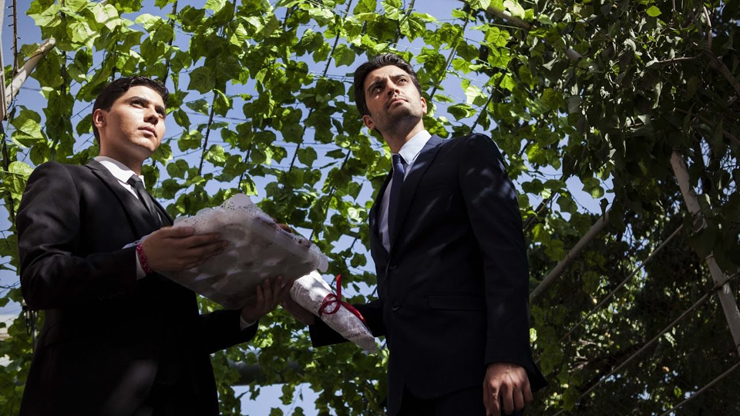
Apricot Groves: Narbe Vartan, Hovhannes Azoyan.
“Apricot Groves,” Saturday, April 22, Regal Cinemas South Beach, 3 p.m.: It's easy to see why this slim, poignant drama, mostly set in present-day Armenia, is walking away with the Jury Award for Best Narrative Feature. The film follows Aram (Narbe Vartan), who's Iranian Armenian but has lived in the U.S. for many years. He's traveling to the motherland to meet his girlfriend's set-in-their-ways and, frankly, pretty glum parents to ask for their blessing.
The film unfolds in the course of that day, as Aram is met at the airport by older brother Arman (Hovhannes Azoyan), gets a haircut, picks up a natty suit and braces for the ritual visit with his future in-laws. Thing is, Aram wasn't born a biological male, something that his main squeeze's dad (Samvel Sarkisyan) doesn't appear to be too keen on. Elephant-in-the-room awkwardness ensues.
Writer-director Pouria Heidary Oureh opts for a spare, clutter-free approach, and that simplicity is becoming. Long silences speak far louder than words, as Aram, his almond-eyed, high-cheekboned face a wellspring of curiosity about his surroundings, navigates this unfriendly territory with grace and determination. Even more touching is his bond with Arman. Azoyan, who's really terrific here, conveys a range of conflicting emotions with depth of feeling.
And yet, at just 79 minutes, “Apricot Groves” often feels drawn out and overlong. One senses it would have been more powerful as a short. As it is, deeply moving moments commingle with other scenes that fall flat. Still, the film is well worth a look for its lyrical imagery and the parallel between gender and national identities drawn by Oureh, who has made an intimate character study that I liked just fine but wanted to like so much more.
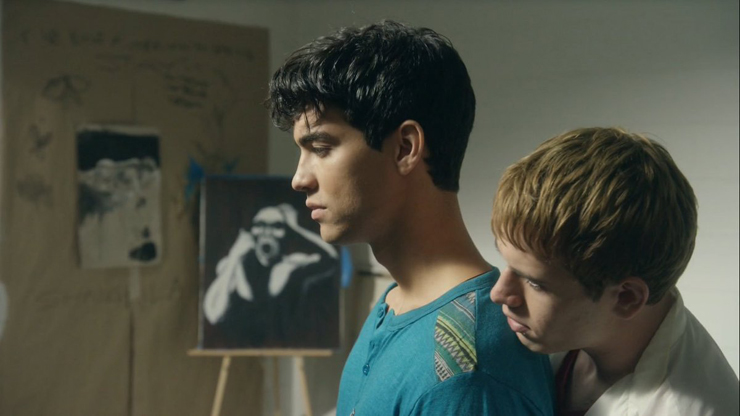
Something Like Summer: Davi Santos, Grant Davis.
“Something Like Summer,” Saturday, April 22, Regal Cinemas South Beach, 7 p.m.: They should have gone all the way and turned it into a break-out-into-song extravaganza. As it stands, though, this engaging, rough-around-the-edges indie musical embraces its limitations and sometimes even turns them into strengths. The scenario? Commonplace but relatable: Openly gay high-schooler Benjamin (Grant Davis) lusts, as so many of us have, after a seemingly unattainable straight jock. But wait: Tim (Davi Santos), tall, dark and handsome, and a budding artist to boot, might actually be, wait for it, secretly into guys!
It all plays like your typical twink fairy tale, at first. But director David Berry and screenwriter Carlos Pedraza, working from Jay Bell's novel, have a longer, more ambitious arc in store for his eventual lovebirds, one that traces the ways their lives keep intersecting through college and early adulthood. Not all of it works. Some scenes are ill-conceived in their execution, and when Berry cuts away from the narrative to a stage where Benjamin and bestie Alison (Ajiona Alexus) belt their hearts out, the transitions are not quite as seamless as they ought to be.
But there's also undeniable appeal to “Something Like Summer's” mix of juvenile comedy and romantic melodrama. In other words, this clunky yet charming wish-fulfillment fantasy is MiFo Miami's guilty pleasure, and it wears its heart on its sleeve in all kinds of winning ways. Imperfect? Yes, but also pretty difficult to resist.

Kept Boy: Jon Paul Phillips.
“Kept Boy,” Saturday, April 22, Regal Cinemas South Beach, 9:45 p.m.: Uneven as “Something Like Summer” is, it's leaps and bounds ahead of this slipshod adaptation of Robert Rodi's frothy 1996 novel, about a pampered pretty boy who's in for a rude awakening, making its world premiere at MiFo. Dennis Racine (Jon Paul Phillips) has been sitting pretty as interior designer/reality TV personality Farleigh Nock's (Thure Riefenstein) prized possession in his lavish L.A. abode, but this sugar daddy's starting to get fed up with the endless succession of pool parties and egregious overspending. When Farleigh, his Teutonic accent recalling a less weathered Werner Herzog, firmly suggests to his thirtysomething househusband that it's time to put down the bottle of Veuve Clicqot and start looking for a job, it sets off all kinds of alarms.
Farleigh, you see, is bleeding money, and the stress opens up fissures in this couple's deceptively superficial connection. Adding to the strain is the arrival of Jasper (cutie patootie Greg Audino), a Colombian stud muffin Dennis initially mistakes for a pool boy. (He isn't.) What's an aging boi to do? Dennis seeks counsel from hunky straight pal Lonnie (John-Michael Carlton), a wealthy cougar's boy toy, and their tart-tongued friend Paulette (Toni Romano-Cohen), herself romantically linked to a member of Congress. The trio concoct a way for Dennis to get back in his longtime companion's good graces, but is it too late to mend fences?
All the elements for a biting social satire are present in the screenplay, written by the late David Ozanich, which updates Rodi's story to the 2010s while still feeling pleasingly retro. Unfortunately, it would be an understatement to say director George Bamber (“The Mostly Unfabulous Social Life of Ethan Green”) isn't up to the challenge of making all of “Kept Boy's” moving parts coexist in harmony, resulting in a jarring tonal dissonance that pits well-acted and staged scenes with others that are jaw-droppingly amateurish and ineptly handled.
It also doesn't help matters that there isn't much chemistry between Phillips, who is well cast, and German-born Riefenstein, who is less well-suited to his role. The coincidences in Rodi's book may have come across as clever on the page, but on screen they keep piling up with complete disregard for plausibility. In addition, the actors' line delivery often feels like they haven't committed to the material, as if they can't be bothered to care about their motivations. So why should we?
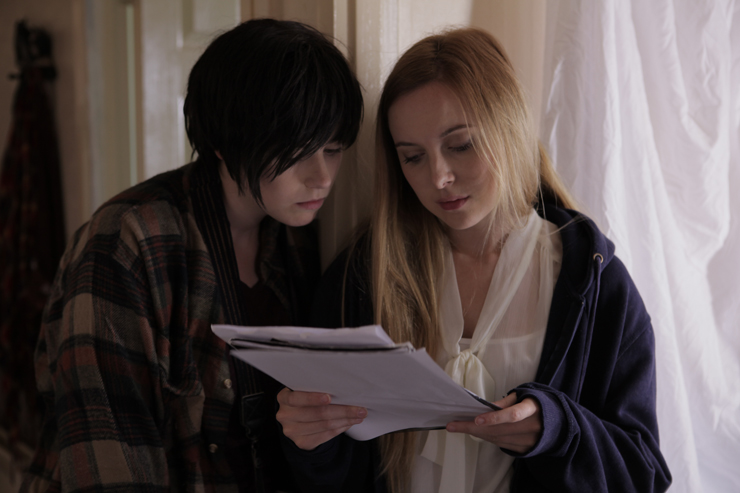
Cat Skin: Jodie Hirst, Faye Sewell.
“Cat Skin,” Sunday, April 23, Regal Cinemas South Beach, 3 p.m.: At least the eroticism in “Kept Boy” feels certifiably queer. This English import, on the other hand, is yet another instance of one of my least favorite cinematic endeavors: the calling card film. In this case, it's a calling card film where a male (and, I'm guessing, straight) filmmaker co-opts a lesbian character's emotional journey in order to get his foot in the door. This is less of a coming-of-age drama involving college students (yep, another one of those) than it is a handsomely shot, and thoroughly inauthentic, show reel assembled with the purpose of finding writer-director Daniel Grasskamp a bigger, more high-profile gig.
But, like a frog in boiling water, it took me a while to make out Grasskamp's endgame. He's ostensibly telling the story of Cat (Jodie Hirst), a budding photographer, and painfully shy loner, who's only comfortable when staring at life through her viewfinder. Working on a project for class, the lens of her heavy, old-school camera comes to rest on straw-haired April (Faye Sewell). Alas, the object of Cat's desire is dating Steven (Isaac Money), who, naturally, is a no-good cad who only wants to go out with April to get into her knickers.
April catches Cat trying to take her picture, and a friendship is born, much to the dismay of Steven and and Sally (Caroline Oakes), April's nosy, micromanaging mom, both of whom (accurately) figure out the extent of Cat's interest. But April scoffs at their misgivings, not only because they're clearly evil people with mustaches to twirl, but also because, pay attention, now, this is important, Her Heart Is Telling Her There Is Something Special About This Girl.
By this point, the cat in “Cat Skin” is out of the bag. All of the pains Grasskamp takes in his naturalistic mise en scene to achieve verisimilitude are devoted to a screenplay so contrived and false it makes daytime soaps feel like docudramas. I felt a morbid compulsion to see the darn thing through, unpleasant as the ordeal was. It would have been more prudent to quit while I was ahead. The central romantic triangle builds toward a climax involving sexual assault and a race against the clock to save the day. I stifled the urge to punch my laptop screen. But hey, at least it looks pretty.
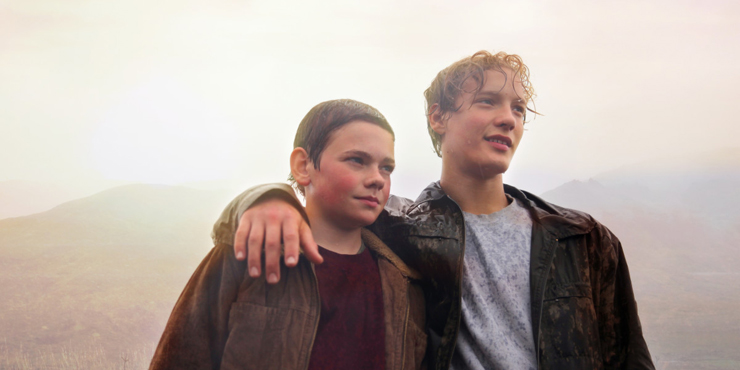
Heartstone: Baldur Einarsson, Blær Hinriksson.
“Heartstone,” Sunday, April 23, Regal Cinemas South Beach, 4:45 p.m.: Are you as sick and tired of coming-of-age movies as I am at this juncture? Set aside your fatigue just this once, because this entry in the shopworn genre, set in a remote fishing village in Iceland, is the tonic to ward off all the “Cat Skins” in this year's Mifo lineup. The film follows baby-faced Thor (Baldur Einarsson) during one tumultuous summer in the ass-backwards, middle-of-nowhere dump he hails from. The pint-sized lad is cute in a boyish and wholesome kind of way. (Einarsson looks a younger male version of “Star Wars: The Force Awakens” star Daisy Ridley.) But facing as he does daily torment and humiliation by two mischief-making sisters and the town bully, he is also working through some serious pent-up aggression. Not helping matters is the fact that he hasn't yet grown any pubes.
But when no one is looking, Thor kisses the bathroom mirror. He needs to practice, after all, because this is the summer when he's finally gonna ask that girl he's had his eye on to go steady.
Wait, what? Thor's a straight boy? Yeah, but hear me out here. Thor's hormones might be going in one direction, but for Kristján (Blær Hinrikson), his best friend and confidante, they're swinging a different way. Kristján is Thor's polar opposite: tall, lanky and mellow. The product of a dysfunctional household ruled with an iron fist by a hard-drinking dad, Kristján might look like he could easily be a popular kid at school, but there's a storm brewing inside him, fed by unrequited longing for his close buddy, and it threatens to consume him.
If this all sounds like “Heartstone” is skirting dangerously close to calamity porn, rest assured that's not the way writer-director Gudmundur Arnar Gudmundsson, here making his feature debut, handles the material. Bolstered by a strong sense of time and place, the film places the emphasis on the fierce bond between the two boys. Thor, plagued by his own insecurities, might sense Kristján's physical attraction, even in the guise of horseplay, but that doesn't make him love his friend any less. It's that visceral attachment between the teens that elevates the film above other similarly themed selections playing at MiFo this year. The situations might be familiar, but Gudmundsson's raw and gritty approach, lightened by some laugh-out-loud bursts of physical humor, makes them feel fresh.
The novice filmmaker also doesn't know when to let up. “Heartstone” is hampered by an overlong and repetitive final half hour that finds the characters moving in circles and the focus shifting back to Thor, at the expense of Kristján, who ends up becoming a secondary player in his own storyline, even while remaining an important part of the film. But this no-holds-barred portrait of youth in revolt continues to haunt me days after having seen it. I feel like I've lived with these people and walked in their shoes. Movies about The Summer That Changed Everything are rarely this immersive. Don't let this one get away.
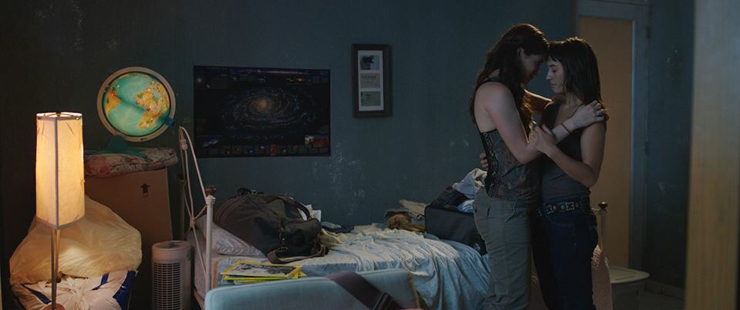
Extra Terrestrials: Prakriti Maduro, Marisé Alvarez.
“Extra Terrestrials,” Tuesday, April 25, Regal Cinemas South Beach, 6:45 p.m.: Say this for this oddball lesbian-themed dramedy from Puerto Rico: It's got chutzpah to spare. Writer-director Carla Cavina tells the story of Teresa Diaz (Marisé Alvarez), a closeted, Tenerife-based astrophysicist who flies home to the Caribbean island after a seven-year absence to tell her family she's planning to wed Venezuelan fellow stargazer Daniela (Prakriti Maduro). But as Teresa arrives at her father Arcadio's (Emmanuel “Sunshine” Logroño) chicken farm, she realizes her family is in the middle of an increasingly nasty tug of war with rival U.S.-based poultry companies intent on using federal legislation to deal a crippling blow to the Diazes' homegrown family business.
Arcadio, a cowboy hat-wearing dinosaur, is estranged from his visiting daughter, who refused to go into the family business as he wanted her to, and she's a vegan on top of that. Meanwhile, Teresa soon discovers that every member of her family, down to her young nephew, who has Asperger's Syndrome, has their own secret to hide. All the while, the family has to deal with escalating threats from their business competitors.
The overstuffed narrative poses a daunting logistical challenge for Cavina, who makes a gallant effort to balance the disparate elements holding “Extra Terrestres” together. Alas, it's evident the filmmaker has bitten off more than she can chew, and she eventually succumbs to the preachiness she had successfully avoided in the early going. She doesn't quite know how to handle the young women's relationship, though admittedly, their flirtation via Skype using astronomy terms is mighty clever. The awkwardness that pervades those scenes eventually extends to the rest of this ambitious yet faulty undertaking, which feels about 10 years behind the curve content-wise. My goodwill waned like stars in the dawning sky.
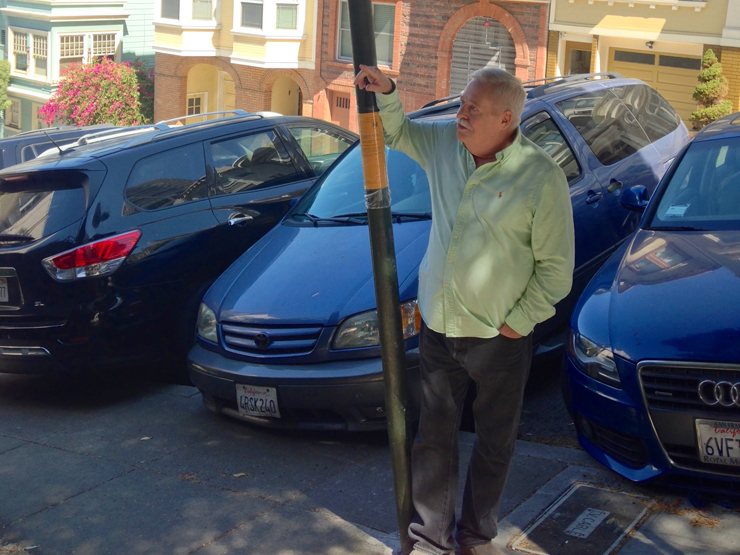
The Untold Tales of Armistead Maupin: Armistead Maupin.
“The Untold Tales of Armistead Maupin,” Tuesday, April 25, Regal Cinemas South Beach, 7 p.m.: Watching this big-hearted documentary about the celebrated author of the “Tales of the City” novels, one thing became clear pretty quickly: This should have been MiFo's Opening Night selection. Instead, this compulsively watchable portrait of a North Carolinian from a deeply conservative background, who found fame and notoriety by becoming one of the most prominent chroniclers of LGBT life in San Francisco, has been buried in a weeknight dinner slot. Makes perfect sense to me.
Much like Maupin himself served as a bridge between conservative and progressive audiences, not to mention straight and LGBT cultures, director Jennifer M. Kroot (“To Be Takei”) has made a movie with a generosity of spirit that reflects both its subject and the community he captured with such eloquence and clear-eyed empathy. “His fiction is a Trojan horse,” marvels English author and kindred spirit Neil Gaiman, referring to the way Maupin, who began “Tales of the City” in serialized form in what became a column for the San Francisco Chronicle, would rope in straight readers until, before they knew it, they became regular readers of LGBT-themed literature.
Kroot doesn't break new ground from a formal point of view, but the conventional talking head/archival footage approach, with some vérité bits from Maupin's speaking engagements thrown in, nevertheless fit the material like a glove. (I could have done without the animated transitions that divide the film into something resembling book chapters. Yes, I know this is nit-picking.)
Over the course of a brisk but never hurried 90 minutes, Kroot covers a life often lived on the public eye, including his days as a young Republican working for U.S. Sen. Jesse Helms (!), with considerable time devoted to Maupin's personal struggles. A-listers like Laura Linney, who played “Tales of the City” protagonist Mary Ann Singleton on the TV adaptations of the first three novels in the series, share screen time with Maupin's baby sister and husband. Movie buffs will also rejoice at the film's depiction of the friendship between Maupin and Rock Hudson, to whom the author lent an attentive ear and even tried to coax, unsuccessfully, into coming out. It is also a valentine to the power of the written word, as well as a tribute to a disappearing print media. Best of all, “Untold Tales” captures Maupin's kindness, his tart-but-sweet brand of storytelling. It makes for a magical, deeply satisfying night at the movies.
The MiFo LGBTQ Film Festival, now OUTshine Film Festivalcelebrates its 19th anniversary with 28 film premieres from April 21 through April 30. For a full list of film screenings and festival events and parties, go to www.mifofilm.com.




